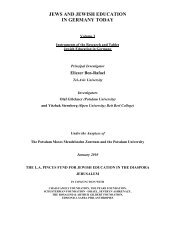jews and jewish education in germany today - The Westbury Group
jews and jewish education in germany today - The Westbury Group
jews and jewish education in germany today - The Westbury Group
You also want an ePaper? Increase the reach of your titles
YUMPU automatically turns print PDFs into web optimized ePapers that Google loves.
But we have to offer people professional choices so that they get committed to their Communities. Aga<strong>in</strong>, I<br />
th<strong>in</strong>k the lead<strong>in</strong>g argument is responsibility. As long as we’re not prepared to shift responsibility to the<br />
Russians, to the majority of our congregants, we will not succeed. And still I can underst<strong>and</strong> the argument<br />
that you cannot shift the responsibility before you have prepared people to do the right th<strong>in</strong>g. First you need<br />
to prepare these people so that they use their responsibility wisely, they will <strong>in</strong> turn know what goals they<br />
should def<strong>in</strong>e for themselves. <strong>The</strong> Jewish Community is not a means <strong>in</strong> itself, it is a means to get more<br />
literate <strong>in</strong> the Jewish tradition. <strong>The</strong>refore, the responsibility shift does not work before you have tackled the<br />
<strong>education</strong>al tasks.<br />
● As the rector of the Abraham Geiger College has your experience <strong>in</strong> cooperat<strong>in</strong>g with German officials<br />
<strong>and</strong> politicians been mostly positive, or rather the opposite?<br />
I th<strong>in</strong>k there’s a great <strong>in</strong>terest of German politics to help to make the <strong>in</strong>tegration work successful, especially<br />
on the federal level. Usually you can overcome this by show<strong>in</strong>g a local politician what k<strong>in</strong>d of a high profile<br />
Jewish issues have on a national level. This has been my experience, <strong>and</strong> I can also prove this by say<strong>in</strong>g that<br />
almost 80% of the money for the rabb<strong>in</strong>ical sem<strong>in</strong>ary comes from the various states of Germany:<br />
For the Federal Republic of Germany, if you have a good plan, you can f<strong>in</strong>d a good partner. For example, the<br />
cantorial school was built with seed money from an American foundation <strong>and</strong> once I could prove that an<br />
American foundation was will<strong>in</strong>g to put some money <strong>in</strong>, the German government immediately gave more<br />
than double the sum so as to make sure that the project can cont<strong>in</strong>ue <strong>and</strong> flourish.<br />
Let me just add that maybe this would be a parallel to the ‘Studienwerk’ [‘Ernst-Ludwig-Ehrlich-<br />
Studienwerk’], the scholarship foundation, where the money that the government provides is, I would say,<br />
98% of the expenses. <strong>The</strong> expectation that the <strong>in</strong>itial set up is done by the benefit<strong>in</strong>g community itself is not<br />
too much to ask, given the fact that most of the costs are then paid for by the government.<br />
So I would say the German political set up for such a foundation is ideal, because once you have a good plan<br />
<strong>and</strong> you put <strong>in</strong> the seed money, you can expect that th<strong>in</strong>gs then are likely to be subsidized by the federal<br />
government.<br />
<strong>The</strong>refore, I th<strong>in</strong>k it’s clear that you get the most out of every dollar or euro you spend <strong>in</strong> terms of<br />
effectiveness, <strong>and</strong> I also th<strong>in</strong>k it’s a most <strong>in</strong>terest<strong>in</strong>g country because we have a very flexible <strong>and</strong> vibrant<br />
situation. If we use this well, Germany can become an immense stimulus, certa<strong>in</strong>ly for the neighbor<strong>in</strong>g<br />
Central <strong>and</strong> Eastern European countries like Pol<strong>and</strong>, or the Czech Republic, but also for France. France has a<br />
pretty stable Jewish Community, but they have no rabb<strong>in</strong>ical tra<strong>in</strong><strong>in</strong>g center, <strong>and</strong> therefore the Rabbis for the<br />
non-Orthodox Jewish communities <strong>in</strong> France are now tra<strong>in</strong>ed by the Abraham Geiger College.<br />
● French students come over to get qualified as Rabbis <strong>in</strong> Berl<strong>in</strong> <strong>and</strong> Potsdam [Abraham Geiger College]?<br />
Yes, we work with French students <strong>and</strong> also cooperate with the Sorbonne. Many Jewish Communities <strong>in</strong><br />
France have only recently become aware of the problem that many Rabbis are close to retirement age <strong>and</strong> so<br />
they have no <strong>in</strong>stitutions that could help <strong>in</strong> a situation such as this. Aga<strong>in</strong>, Germany can become an important<br />
factor <strong>in</strong> affect<strong>in</strong>g Jewish life <strong>in</strong> Europe because of the high level of government support.<br />
75 | P a g e



